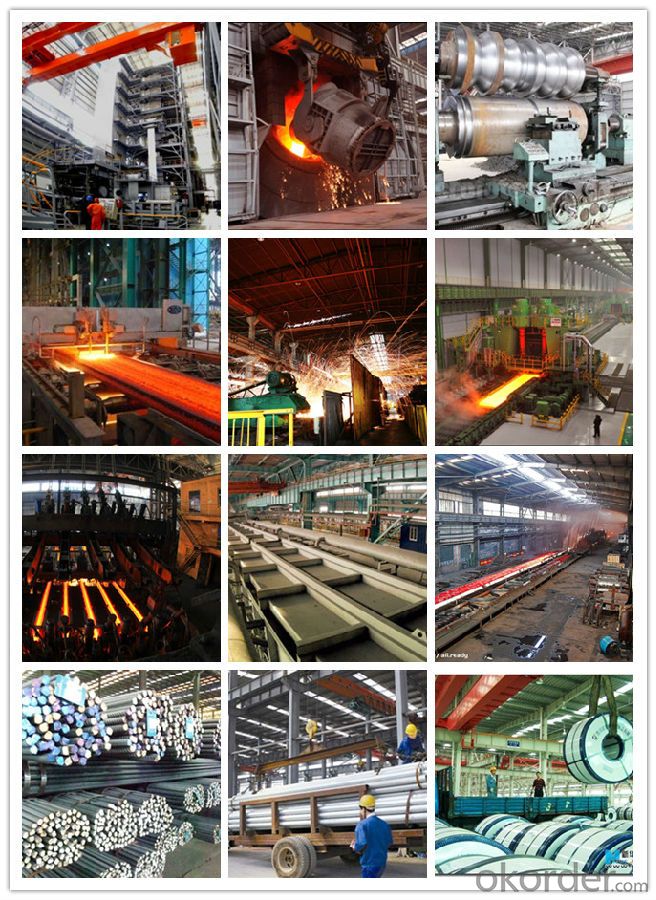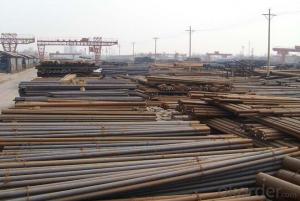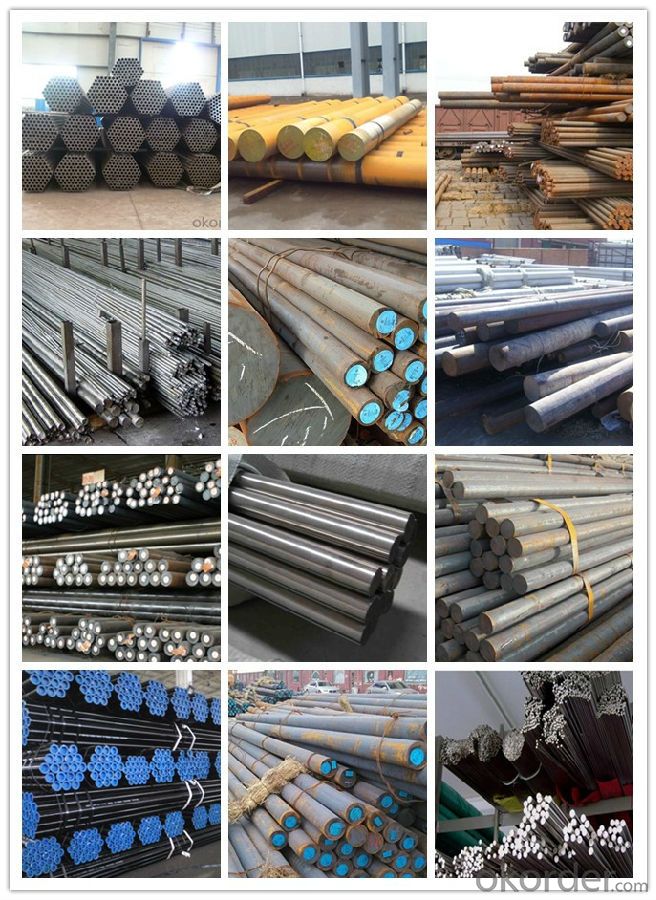Special Steel 1045 / S45C / C45 Carbon Tool Steel
- Loading Port:
- China main port
- Payment Terms:
- TT OR LC
- Min Order Qty:
- 30 m.t.
- Supply Capability:
- 10000 m.t./month
OKorder Service Pledge
OKorder Financial Service
You Might Also Like
Item specifice
Product information
carbon steel AISI1045\DIN1.1191\S45C\GB45
1.Annealed to HBS<220; hot rolled,black.
Used for making die-board,general
2.Chemical compostion:
C | Si | Cr | Mn | Ni | P | S | Cu |
0.42-0.55 | 0.17-0.35 | ≤0.022 | 0.50-0.75 | ≤0.012 | ≤0.018 | ≤0.01 | ≤0.017 |
3.Round sizes:
Dia 30-350mm Length 2500-4000mm or on your request.
4.Factory condition:
Annealed to HBS<220;hot rolled,black.
5.Application:
Used for making die-board,general machinery parts.
Product show
Workshop show

Shipping
1. FedEx/DHL/UPS/TNT for samples, Door-to-Door;
2. By Air or by Sea for batch goods, for FCL; Airport/ Port receiving;
3. Customers specifying freight forwarders or negotiable shipping methods!
Delivery Time: 3-7 days for samples; 5-25 days for batch goods.
Payment Terms
1.Payment: T/T, L/C, Western Union, MoneyGram,PayPal; 30% deposits; 70% balance before delivery.
2.MOQ: 1pcs
3.Warranty : 3 years
4.Package Informations: 1) EXPORT, In 20 feet (GW 25 ton) or 40 feet Container (GW 25 ton)
2)as customer's requirement
Why choose us?
(1) The leading exporter in China special steel industry.
(2) Large stocks for various sizes, fast delivery date.
(3) Good business relationship with China famous factories.
(4) More than 7 years steel exporting experience.
(5) Good after-sales service guarantee.
- Q:How does special steel contribute to the construction equipment industry?
- Special steel plays a crucial role in the construction equipment industry by providing the necessary strength, durability, and resistance to wear and tear that is required in heavy-duty equipment. Construction equipment is subjected to extreme conditions, including heavy loads, harsh environments, and constant use. Special steel alloys are specifically designed to withstand these conditions and ensure the longevity and reliability of the equipment. One of the key contributions of special steel to the construction equipment industry is its high strength-to-weight ratio. This allows manufacturers to design and produce equipment that is both strong and lightweight. The use of special steel in the construction of equipment components such as chassis, booms, buckets, and blades increases their load-carrying capacity and improves overall performance. Special steel also offers excellent resistance to corrosion, which is a significant advantage in construction sites that expose equipment to moisture, chemicals, and other corrosive substances. By using corrosion-resistant special steel alloys, manufacturers can prolong the lifespan of construction equipment and reduce maintenance costs. Furthermore, special steel contributes to the construction equipment industry by providing superior wear resistance. Construction equipment is subjected to abrasive materials such as rocks, gravel, and concrete, which can cause significant wear on the equipment's components. Special steel alloys with high hardness and wear resistance properties help minimize wear and extend the equipment's service life, reducing the need for frequent replacements and downtime. In addition, special steel enables the construction equipment industry to meet specific performance requirements. Different types of special steel alloys can be tailored to meet specific needs such as impact resistance, high-temperature resistance, or low-temperature toughness. This versatility allows manufacturers to produce equipment that can operate efficiently in a wide range of conditions, enhancing the industry's overall productivity. Overall, special steel contributes significantly to the construction equipment industry by providing the necessary strength, durability, resistance to wear and tear, and customization options. By utilizing special steel alloys, manufacturers can produce high-quality equipment that meets the demanding requirements of construction sites, ultimately improving productivity, safety, and efficiency in the industry.
- Q:How does special steel perform in terms of electrical resistivity?
- Special steel typically has higher electrical resistivity compared to other types of steel. This means that it offers greater resistance to the flow of electric current, making it less conductive.
- Q:How does special steel withstand extreme temperatures?
- Special steel is designed to withstand extreme temperatures due to its unique composition and manufacturing process. It contains a higher percentage of alloying elements, such as chromium, nickel, and molybdenum, which enhance its heat resistance properties. These alloys form a protective layer on the surface of the steel, preventing oxidation and corrosion at high temperatures. Additionally, special steel undergoes specific heat treatment methods, such as quenching and tempering, which further enhance its ability to withstand extreme temperatures without losing its strength and structural integrity.
- Q:What are the different impact-resistant grades of special steel?
- Steel alloys known as impact-resistant grades are designed to withstand high impact and shock loads without fracturing or deforming. These grades of steel are crucial in industries like construction, mining, automotive, and defense, where resistance to impact and toughness are essential. Numerous impact-resistant grades of special steel are available, each with its own unique characteristics and properties. Some commonly used grades include: 1. AR400: This steel has a hardness of 400 Brinell (HB) and is highly resistant to abrasion and impact. It finds applications in bucket liners, crushers, and hoppers where wear resistance is critical. 2. AR500: With a hardness of 500 HB, AR500 steel offers even greater resistance to wear and impact compared to AR400. It is frequently used in heavy machinery, mining equipment, and armored vehicles. 3. AR600: This steel boasts a hardness of 600 HB, making it one of the toughest and most impact-resistant options. It is ideal for applications that require extreme wear resistance and durability, such as chutes, conveyors, and ballistic protection. 4. T-1: T-1 steel is a high-strength, low-alloy (HSLA) steel that delivers excellent impact resistance and toughness. It is commonly utilized in structural components, heavy equipment, and offshore drilling rigs, where high strength and toughness are essential. 5. QT or Quenched and Tempered Steels: These steels undergo specific heat treatment to enhance their toughness and impact resistance. They are popular in applications that demand high strength, toughness, and impact resistance, such as gears, shafts, and armor plates. It is important to note that the impact resistance of a specific steel grade depends not only on its composition but also on factors like heat treatment, fabrication techniques, and design considerations. Therefore, consulting steel manufacturers or experts is crucial in determining the most suitable impact-resistant grade for a particular application.
- Q:How does tool steel maintain its hardness at high temperatures?
- Tool steel maintains its hardness at high temperatures primarily due to its high carbon content and the presence of other alloying elements. The carbon in tool steel forms hard and wear-resistant carbides, which help retain hardness even at elevated temperatures. Additionally, alloying elements such as chromium, tungsten, molybdenum, and vanadium contribute to the formation of secondary carbides, which further enhance the steel's resistance to softening and maintain its hardness under high heat conditions.
- Q:Can special steel be used in the battery manufacturing industry?
- Yes, special steel can be used in the battery manufacturing industry. Special steel is often used in battery production for various purposes, such as in the construction of battery casings, terminals, and other components. Its high strength, durability, and resistance to corrosion make it suitable for ensuring the safety and longevity of batteries.
- Q:What are the different electroplating techniques used for special steel?
- There are several electroplating techniques used for special steel, including electroless nickel plating, zinc plating, and chromium plating. Each technique offers unique benefits and properties that are tailored to the specific requirements of the special steel being plated.
- Q:How long does special steel last compared to regular steel?
- Due to its unique composition and properties, special steel tends to have a longer lifespan than regular steel. Regular steel primarily consists of iron and carbon, while special steel is alloyed with elements like chromium, nickel, and molybdenum to enhance its strength, hardness, and resistance to corrosion. The lifespan of special steel is influenced by factors such as the specific type of steel, its usage conditions, and maintenance practices. However, in general, special steel has a significantly longer lifespan compared to regular steel. It exhibits greater resistance to wear and tear, corrosion, and high temperatures, making it suitable for demanding applications and environments. Industries such as aerospace, automotive, and construction extensively utilize special steel for critical components like engine parts, structural elements, and cutting tools. These components often endure high stress, friction, and exposure to harsh conditions. Special steel's exceptional properties enable it to withstand these challenges and maintain its performance for an extended period. Furthermore, special steel undergoes rigorous testing and quality control measures during its manufacturing process. This ensures that it meets specific industry standards and can endure extreme conditions without significant degradation. In contrast, regular steel may not possess the same level of durability or longevity. In conclusion, special steel generally lasts longer than regular steel due to its enhanced properties and resistance to wear, corrosion, and high temperatures. Although the exact lifespan may vary depending on various factors, special steel's superior characteristics contribute to its prolonged durability.
- Q:What are the different shapes and forms in which special steel is available?
- Special steel is available in various shapes and forms to cater to different industrial and engineering applications. Some common shapes and forms of special steel include: 1. Bars: Special steel bars are widely used in construction, automotive, and machinery industries. They are available in round, square, hexagonal, and flat shapes, offering flexibility in design and ease of machining. 2. Sheets and Plates: Special steel sheets and plates are used in manufacturing various components and structures that require high strength and durability. They are available in different thicknesses and sizes, making them suitable for diverse applications. 3. Tubes and Pipes: Special steel tubes and pipes are commonly used in industries such as oil and gas, construction, and automotive. They come in various dimensions and can be seamless or welded, catering to specific requirements. 4. Wire: Special steel wire is widely used in manufacturing springs, cables, fasteners, and other products that require high tensile strength and resistance to corrosion. It is available in different diameters and can be further processed through processes like drawing or annealing. 5. Forgings: Special steel can also be obtained in the form of forgings, which are shaped through controlled heating and mechanical pressure. Forgings offer excellent strength and toughness, making them suitable for critical components in aerospace, power generation, and heavy machinery industries. 6. Castings: Special steel castings are produced by melting the steel and pouring it into molds. This allows for the production of complex shapes and intricate details, making castings ideal for applications in the automotive, energy, and mining sectors. 7. Profiles: Special steel profiles are customized shapes that are specifically designed to meet unique engineering requirements. They can be extruded, rolled, or cold-drawn, and are widely used in industries such as construction, transportation, and manufacturing. These are just some of the many shapes and forms in which special steel is available. The choice of shape and form depends on the specific application and the desired mechanical properties required for the end product.
- Q:Can special steel be used in the railway industry?
- Yes, special steel can be used in the railway industry. Special steel, such as high-strength steel or corrosion-resistant steel, can be utilized for various applications in the railway industry, including the construction of tracks, bridges, and locomotives. These types of steel offer enhanced durability, strength, and resistance to wear and tear, making them suitable for the demanding conditions and heavy loads encountered in the railway sector.
1. Manufacturer Overview |
|
|---|---|
| Location | |
| Year Established | |
| Annual Output Value | |
| Main Markets | |
| Company Certifications | |
2. Manufacturer Certificates |
|
|---|---|
| a) Certification Name | |
| Range | |
| Reference | |
| Validity Period | |
3. Manufacturer Capability |
|
|---|---|
| a)Trade Capacity | |
| Nearest Port | |
| Export Percentage | |
| No.of Employees in Trade Department | |
| Language Spoken: | |
| b)Factory Information | |
| Factory Size: | |
| No. of Production Lines | |
| Contract Manufacturing | |
| Product Price Range | |
Send your message to us
Special Steel 1045 / S45C / C45 Carbon Tool Steel
- Loading Port:
- China main port
- Payment Terms:
- TT OR LC
- Min Order Qty:
- 30 m.t.
- Supply Capability:
- 10000 m.t./month
OKorder Service Pledge
OKorder Financial Service
Similar products
New products
Hot products
Related keywords































